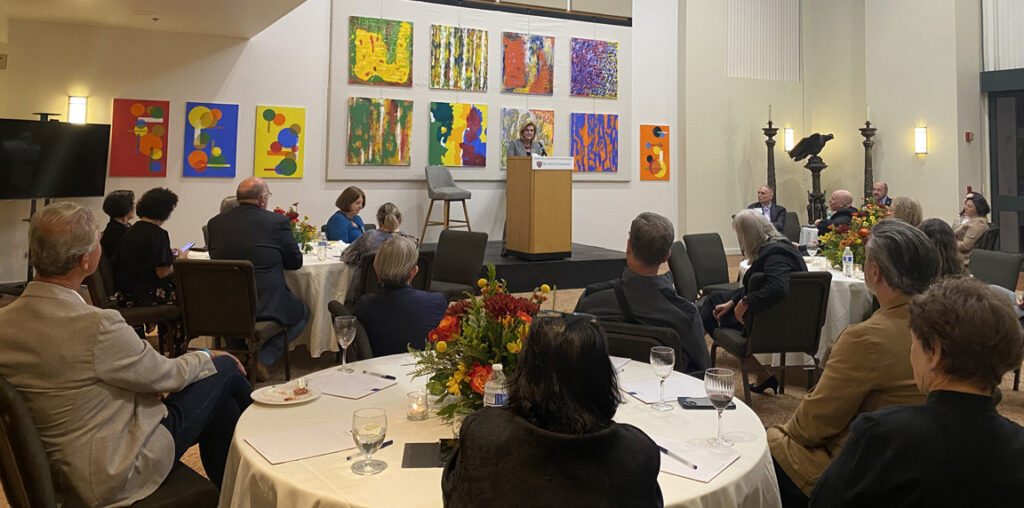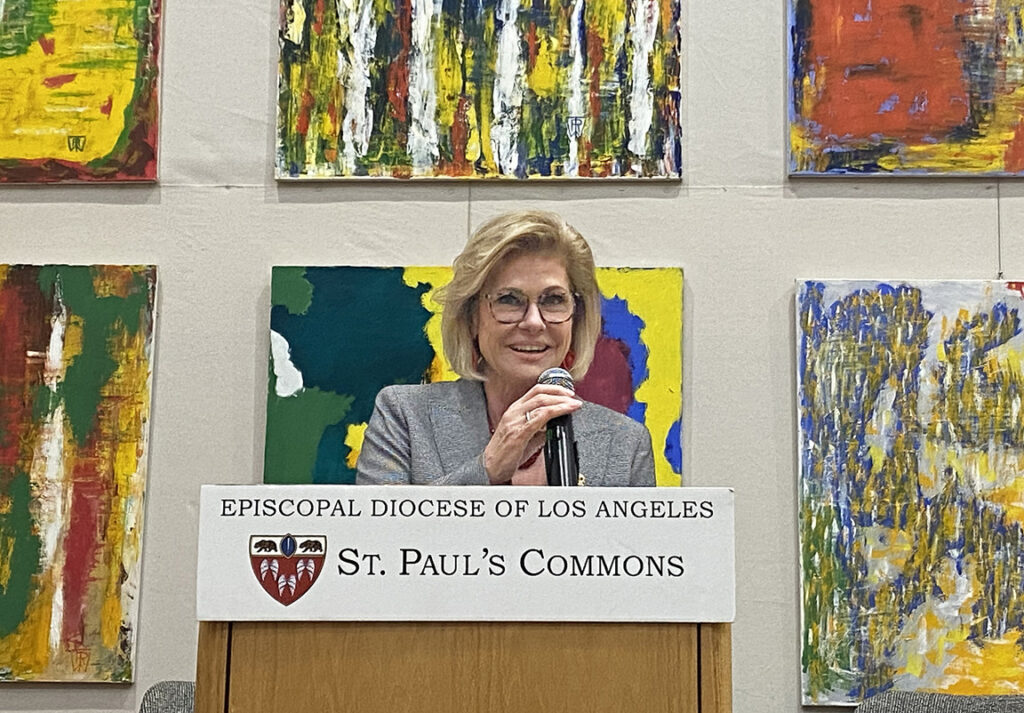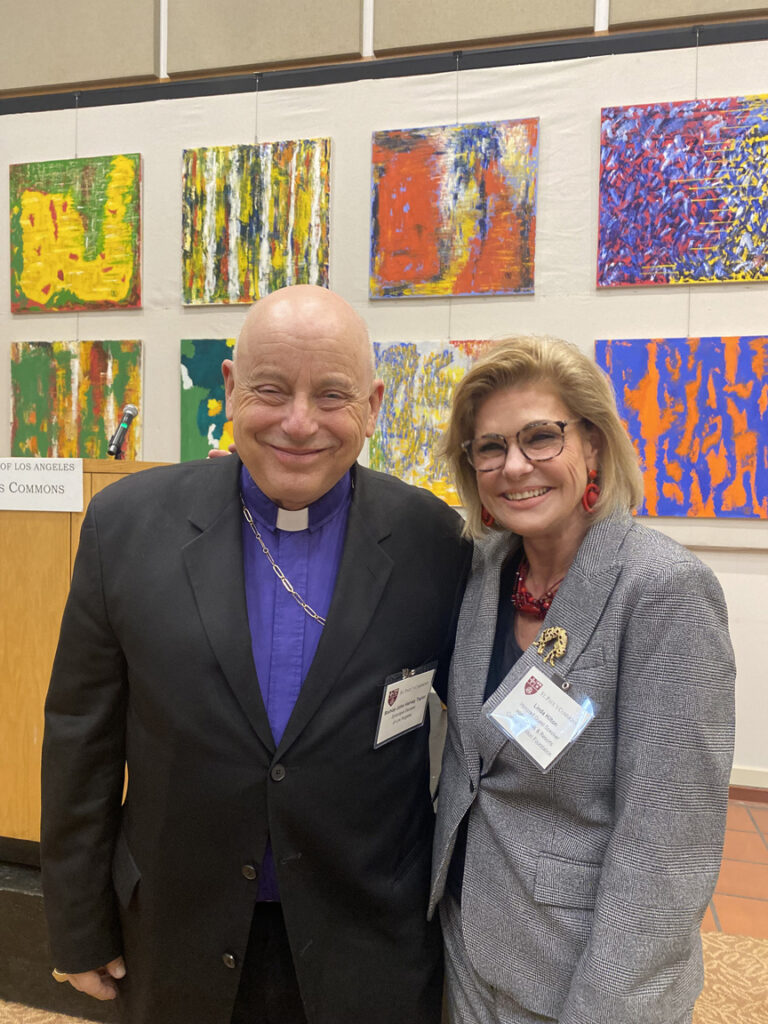
Linda Hilton spoke at “The Light of Hospitality,” a Nov. 2 event at St. Paul’s Commons Retreat Center. Photo: Keith Yamamoto
[The Episcopal News] Bishop John Harvey Taylor sold Linda Hilton “like nobody’s business” on St. Paul’s Commons retreat center, the granddaughter of hotelier Conrad N. Hilton told a Nov. 2 gathering in Echo Park. “I want to come back,” she said. “He made it exciting.”
Hospitality boils down to welcoming guests as if inviting them into your own home, said Hilton, senior director of intermediary group sales for the Hilton Hotels and Resorts, and vice chair of the Conrad N. Hilton Foundation. She was the featured speaker for “The Light of Hospitality” a campaign to encourage overnight guest stays at the St. Paul’s Commons Retreat Center.
Whether offering guests warm chocolate chip cookies and bottled water upon arrival, or good old-fashioned enthusiasm and gracious hospitality, welcome rituals are important, Hilton said.

Linda Hilton shares stories of the hospitality business with guests at St. Paul’s Commons. Photo: Keith Yamamoto
Welcoming guests is “the first chance you have to make a long-lasting customer here, or somebody that wants to visit again,” she said. “It symbolizes what the facility is all about. It’s offering refreshments. It’s creating space for the newcomers, making them feel comfortable and accepted.”
Taylor praised Hilton’s “radical belonging” philosophy, noting that it is applicable to church congregations. The gathering drew about 40 people and included diocesan staff-directed tours of the facilities, with its 16 retreat rooms each with two twin beds; conference and meeting space; rooftop terrace; state-of-the-art technical amenities; and food and beverage service – all part of the center’s availability for “lakeview hospitality” for church vestries and other groups, Taylor said.
“There’s not a mini bar in every room or a television set, because we’re a classic retreat center,” he said. “We offer peace and quiet, the opportunity to walk around the lake, to have your nonprofit organization come and enjoy these beautiful surroundings and enjoy the presence of the Immaculate Heart Community,” which relocated to the Echo Park location earlier this year.
Taylor noted that while some Episcopal dioceses have opted to close their central headquarters and relocate staff to various churches as cost savings measures, “we want to build up the event business so we can justify keeping our beating heart downtown, and keeping the headquarters of the Episcopal Diocese of Los Angeles open.”
A lifetime in hospitality
Hilton told the gathering she was “born into the hospitality business. My birth certificate actually does not have an address on it, but a hotel name. The Shamrock Hilton Hotel is listed as my home address.”
Known for his optimism, honesty, and keen people and observational skills, her grandfather eventually created the largest and most profitable international hotel empire of his era. He purchased his first hotel in Cisco, Texas, during the 1919 oil boom, upon learning that room occupancy turned over three times a day.

Bishop John Harvey Taylor and Linda Hilton pose in the Great Hall at St. Paul’s Commons. The artwork on the walls is part of an exhibition titled “Abstracts in Action: Paintings by the Rev. Canon Warner R. Traynham.” Photo: Keith Yamamoto
Surprisingly, he went to Cisco to buy a bank, not a hotel, but rejected the original purchase when a banker tried to change terms of the deal, Hilton said. Her grandfather wandered across the street to a hotel, was told they had no vacancies, but decided to stay and observe the activity. Guests stayed an average four hours before hurrying back to the oil fields to try and strike it rich. Even the hotel owner wanted to try his luck with the oil fields and agreed to sell, she said.
The senior Hilton doubled the capacity for guests, introducing six-times-a-day occupancy and created the concept of ‘grab and go’ in the hotel restaurant. “He moved the food by the door, so people could buy it, grab it and go, because that’s what they all wanted to do. He doubled his profits in the first month” and, surprising even himself, became a hotelier.
Conrad Hilton rebuilt the business after nearly losing everything during the Great Depression, penned a 1957 memoir, “Be My Guest,” and established a culture that remains the hotel chain’s vision statement today: “It has been and continues to be our responsibility to fill the earth with the light and warmth of hospitality.”
Through his tutelage, the company determined what customers wanted and how to take care of them, becoming the first hotels to include telephones, televisions, and air conditioning in guest rooms, Linda Hilton said.
The diocesan retreat center’s affordability and flexibility typify alignment with a culture of meeting people where they are and giving them what they want, Hilton said. True hospitality involves making sure “people are comfortable, that they’re welcome, that you are engaged with them … that they know they can come to you. And that whatever they ask, they’re going to get what it is that they need. It’s just about the same thing as bringing a stranger into your home.”
Five things need to happen for a culture to be hospitable, Hilton added:
- Teamwork: “Everybody needs to be singing from the same hymnbook. I believe in a culture of one team. My grandfather had a quote: ‘look up to people when you can and down to no one.’ Everyone has a purpose. You can’t just say it – you have to demonstrate and live it too.”
- Enthusiastic participation: Knowing the purpose of a customer’s meeting and becoming an extension of that. “Become a partner, help them deliver … become part of their team and help execute what they envisioned to happen.”
- Inclusivity: “Be inclusive, embrace diversity. Creating the space and helping them to do that is so, so important these days. It’s all about belonging. It’s about making them feel like they belong at the table.
- Personal connection: “The more you know about a group or what they want to accomplish, the more you can deliver and even surprise and delight them.” She added: “Do as much as you can to be empathetic. Maybe it’s a funeral (the customer is planning). Understand what it is. (If it’s a party) let’s go party … to make them feel how important it is that they are doing this.”
- Safety: The emergency plan posted by the elevator in the St. Paul’s Commons garage helps to telegraph to visitors and guests that “we have a plan. It reminded me about how important it is, knowing there is a contingency plan, (that) … you are there to protect them; you’re not going to just leave them.”
When problems arise, as they inevitably do, transparency is essential, without finger pointing or blaming, but just seeing the guests through to a solution is most helpful, she added.
By providing an environment of hospitality and fostering a sense of belonging, “you actually have the opportunity to change the world, one visit at a time,” Hilton said.
Canon Anilin Collado, diocesan retreat center manager, called Hilton’s presentation “inspirational. It was a wonderful gathering. It was good to see familiar faces that had used our facilities over the years and who have enjoyed returning, along with new people who might return and help us with our marketing.”
As the retreat center — opened in 1994 — continues to rebound from pandemic-related declines in bookings, Collado added that hospitality means “seeing Christ in every person that comes into this building. Perhaps there is a bigger response from St. Paul’s Commons. In many ways, we are a place of hospitality. Our guests have raved about how hospitable we are.”
